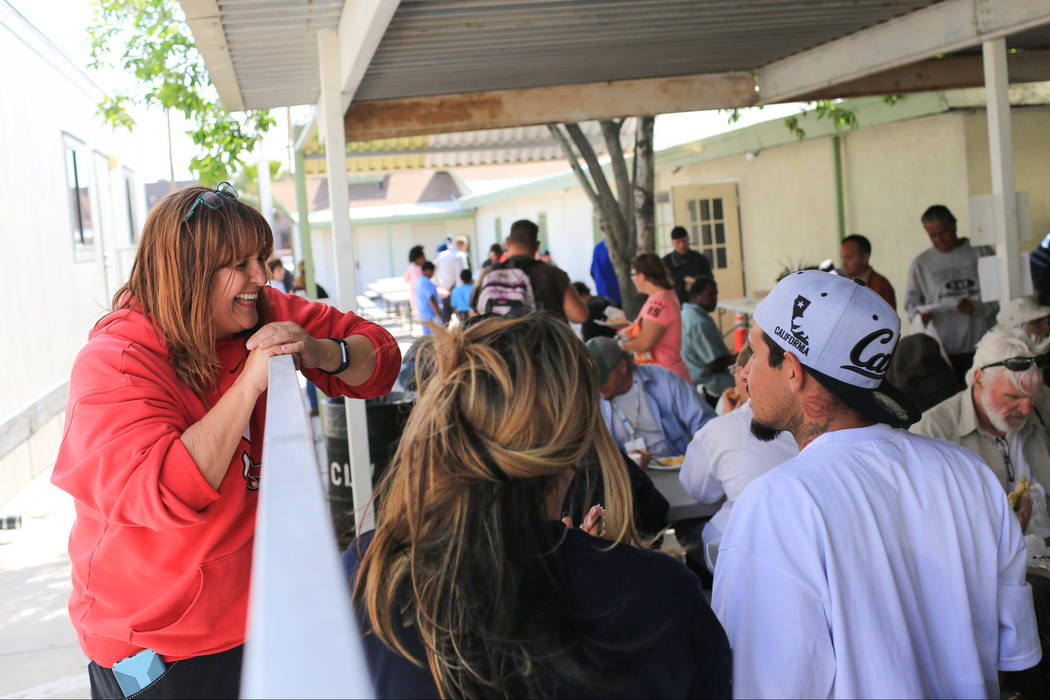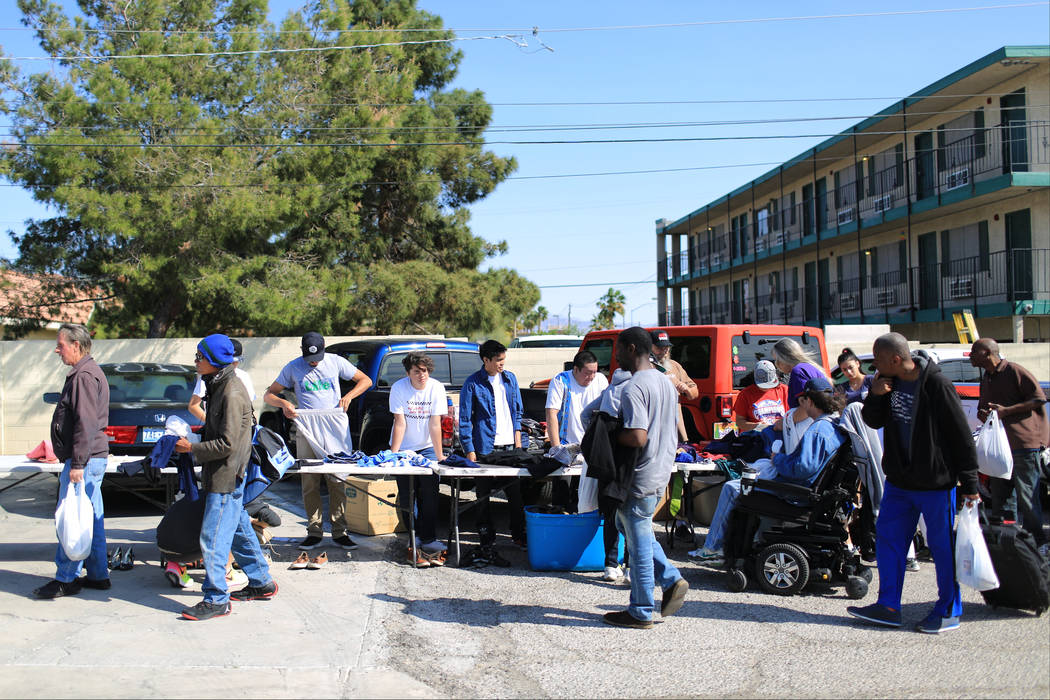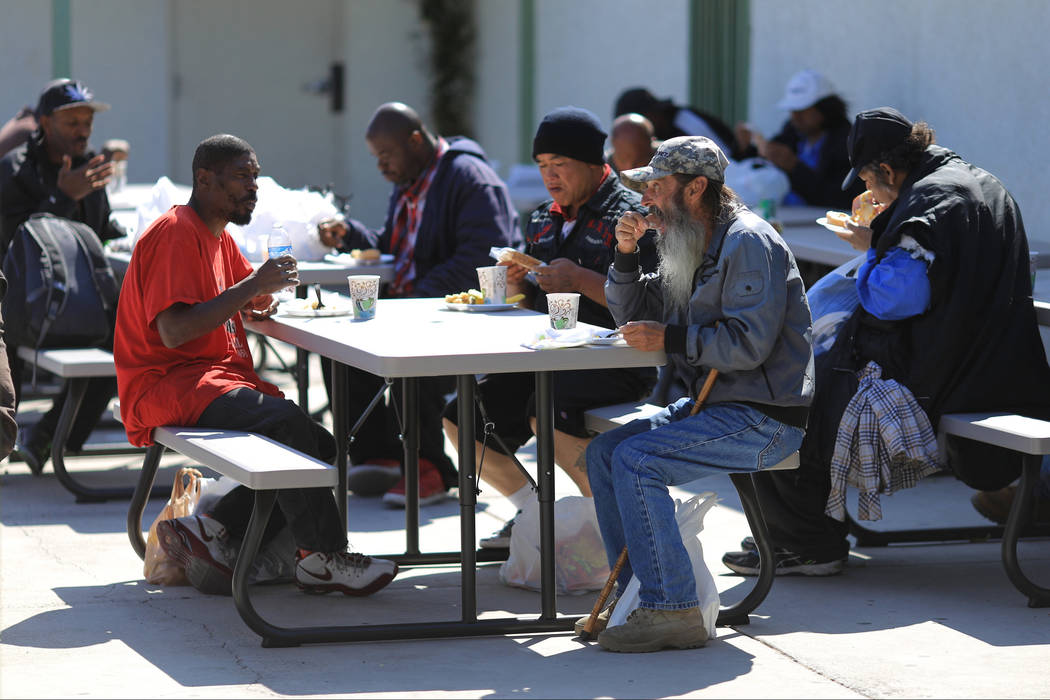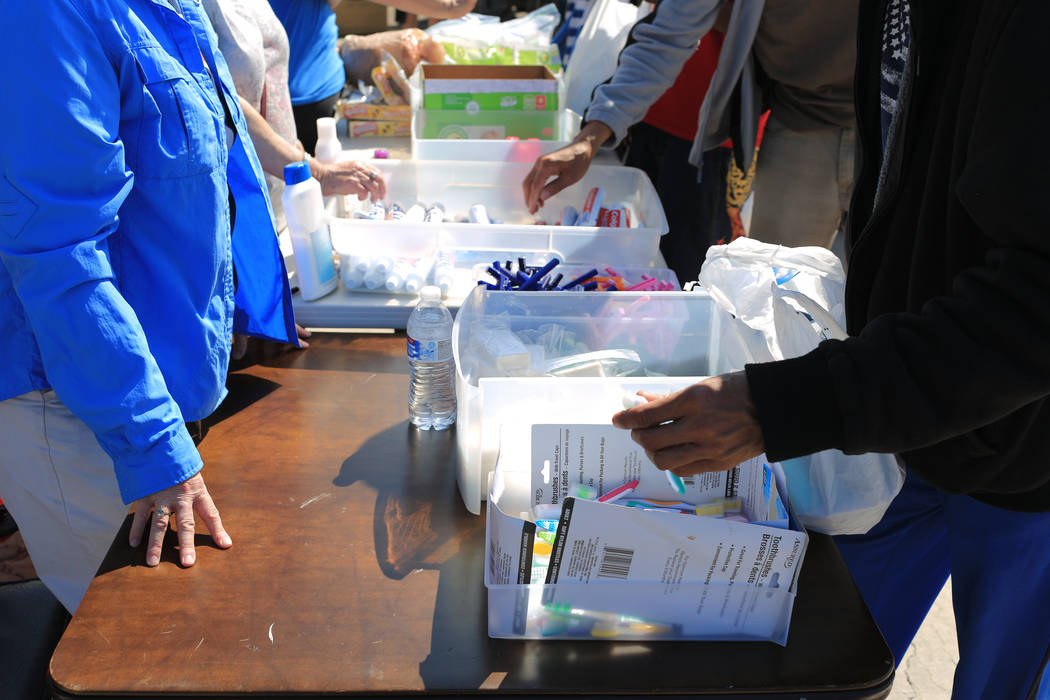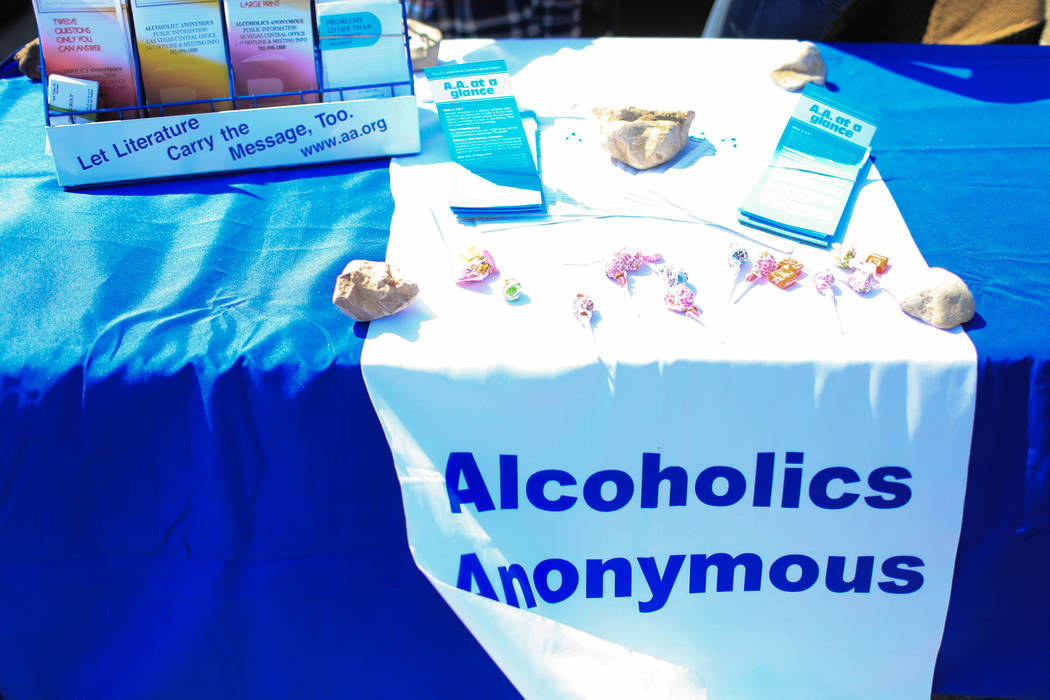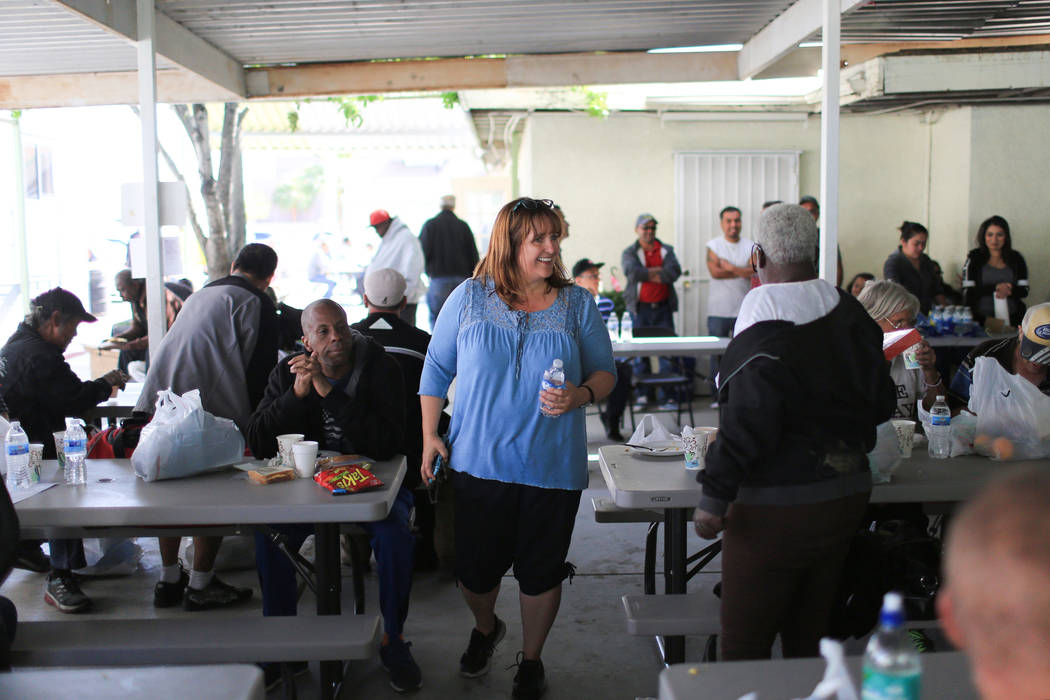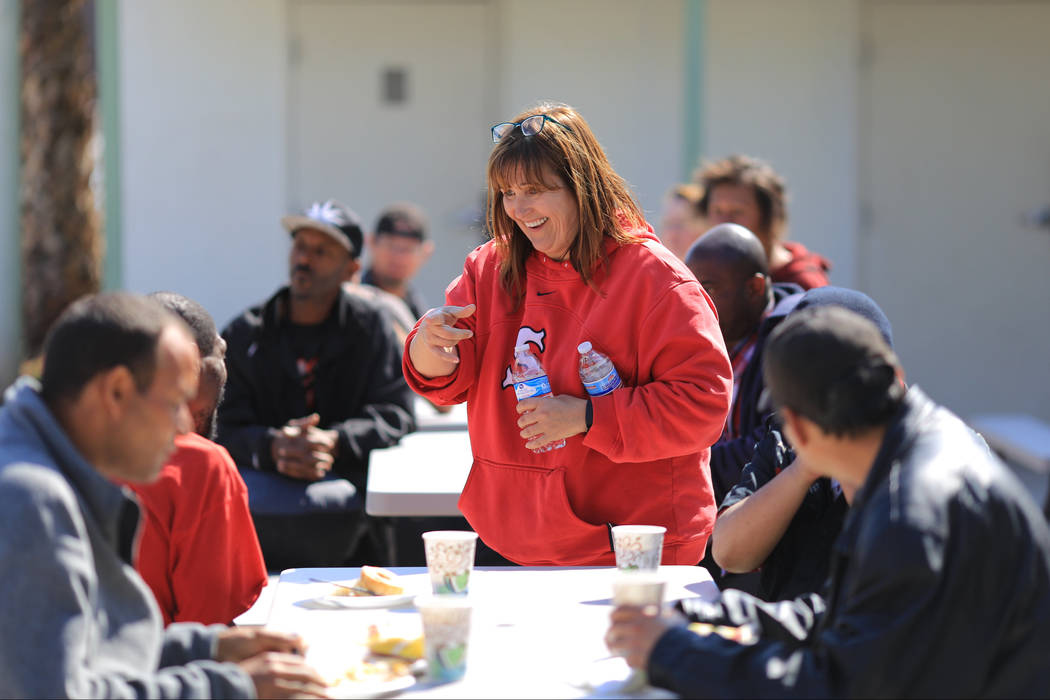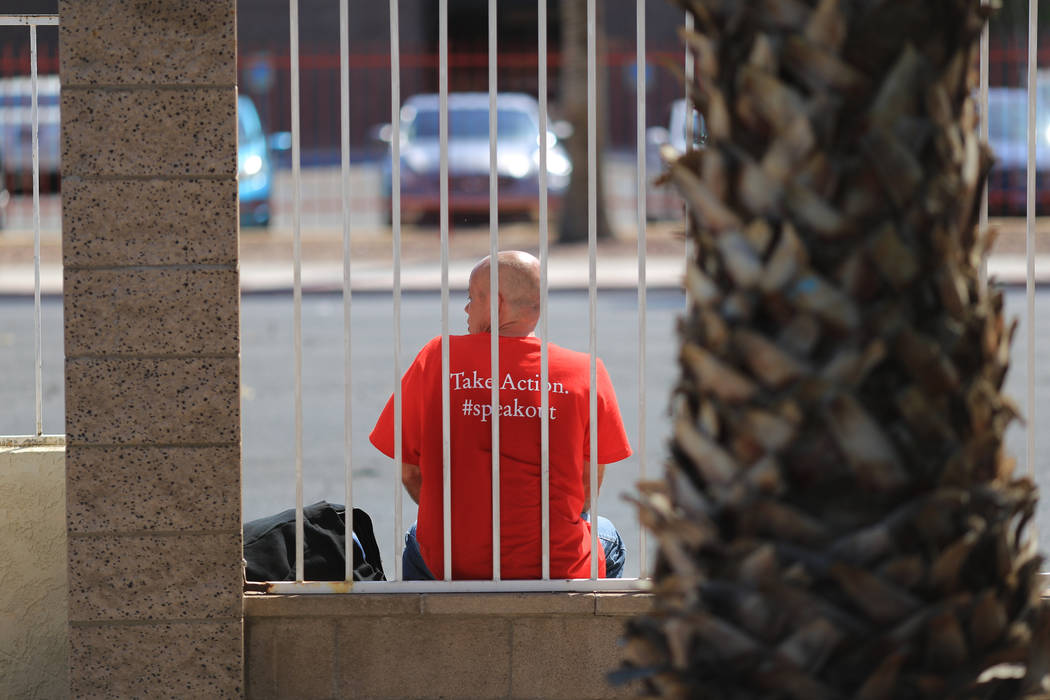Want to help North Las Vegas’ homeless? Don’t hand out food, advocates say
Homeless people have many needs, but access to food is not one of them, those close to the issue say.
“People are not really starving around here,” Michael, who declined to give his last name, said during a meal at Catholic Charities of Southern Nevada. “We can eat all day.”
The area known as the Corridor of Hope, which is concentrated in downtown Las Vegas, is home to several social services and nonprofit organizations that help the homeless, including Catholic Charities, Las Vegas Rescue Mission and the Salvation Army Southern Nevada. Those in need can receive free meals at those places throughout the day, every day.
However, on weekends it’s common to see well-meaning residents passing out food and other items to homeless people in the Corridor of Hope, sometimes right in front of service buildings. City officials, the Las Vegas Metropolitan Police Department and some homeless people say passing out food does more harm than good.
“What we see is people with the best intentions come to an area like that where there’s a large group of homeless people,” Metro Police Downtown Area Command Capt. Andrew Walsh said, adding, “When they bring food, it just gets thrown in the streets, so it becomes a bigger strain that people have to clean up … I think they’re operating under the impression that there are no services for them.”
The City of Las Vegas has created public service announcements with the help of organizations such as the Salvation Army and Catholic Charities to inform people about the unintended consequences of street feeding.
The cleanup
Sgt. Bret Ficklin, who has been working for the Downtown Area Command for two years, said his job entails dealing with issues involving “underlying crime issues,” including squatter properties and homelessness.
The city’s rapid-response cleanup crew sends out two dump trucks and a water truck to clear the streets and sidewalks of garbage, urine, feces and other waste twice a week.
“It’s not stuff homeless people are bringing to the area; that’s all stuff people are bringing to the homeless,” Ficklin said, adding that he has one police officer assigned to dealing with the trash.
Part of the problem is that homeless people don’t have anywhere to store food. And if they don’t eat the food right away, they sometimes throw it out, attracting pigeons and other rodents. Packaging from food items, such as boxes or bags, also gets tossed onto the side of roads.
“People have driven down to Foremaster Lane and have donated jars of honey,” Catholic Charities media and community-relations director Leslie Carmine said. “The cleanup wasn’t nice, and (the honey) ended up on the street.”
Unwanted clothing also ends up in the streets, Carmine said.
Health hazard
Saving food for later presents another danger.
Luis Sanchez, who often eats at Catholic Charities, said he got sick about three years ago after eating contaminated chicken that was given to him and landed in the hospital.
“I have a defibrillator in my heart that right away sent a message to it … I had to get tests done,” he said.
Sanchez, who is from Venezuela and has worked in the U.S. for nearly 30 years, said he has seen people try to save food such as meat or cheese, which could make them sick.
“People leave food here and save, like, a sandwich for the next day, and I think that’s very unsafe because it’s not refrigerated,” he said. “We don’t know if they have cooked the food safely.”
Sanchez said he doesn’t accept food from street feeders anymore.
Deacon Tom Roberts, the CEO of Catholic Charities, said his agency has a commercial kitchen and a licensed chef.
“It’s so much better than giving out a bologna sandwich to them, because they are vulnerable, health-wise,” he said. “That might actually make them sick. … They deserve to be treated with dignity and compassion, and that’s what we do here every day.”
Chaos in the corridor
Some people who receive extra food sell or trade it for other goods.
“One remedy would be to give a ticket to people and have them get in a line to receive items,” Sanchez said. “And when the people come up in the line, they should be required to show a ticket.”
Sanchez and Michael said they have seen fights over items that are passed out.
Some people fall into homelessness because of mental illness and alcohol or drug use, Ficklin said, which presents a danger for people who pass out items.
Michael said he would like to see the community work together to provide things homeless people actually need, such as job resources, computer classes or transportation to medical appointments.
“I’d take that over a sandwich,” he said.
Street feeding also helps homeless people sustain a life on the streets, Walsh said.
“When they don’t have to go into Catholic Charities or the Salvation Army … that’s one less interaction they’d have with a caseworker,” he said. “People can help extend the services that already exist. It saves people time and money.”
The Giving Project
Although it’s not illegal to pass out items to homeless people, police can give someone a $300 ticket for parking in a red zone, Ficklin said. He said he never actually gives out tickets; rather, he uses the opportunity to inform people about the consequences of street feeding.
“When we talk enforcement and let them know the issue, they think the police don’t want us to feed the homeless. … We don’t want to dissuade people from giving,” Ficklin said. “That’s what makes us human. We want to provide a safe and organized way of helping out the homeless.”
Ginger McLaughlin of the northwest valley recalls such an encounter with a police officer. She was passing out peanut butter and jelly sandwiches near Las Vegas Academy when an officer stopped her nearly two years ago.
“The officer said, ‘You know there’s a place where you could do that?’” McLaughlin recalled.
The officer invited her to meetings for The Giving Project, a community effort started by the Metropolitan Police Department about three years ago to deal with street-feeding issues. The project is backed by nonprofit and faith-based organizations.
McLaughlin began volunteering, then took over as project manager of its monthly event in October.
That event is from 10 a.m. to noon the second Saturday of each month. Volunteers including citizens, churches and organizations prepare food and provide services for people who need them. Organizations such as Southwest Medical, Narcotics Anonymous and a group that handles birth certificates have hosted booths at the event, held at 1401 Las Vegas Blvd. North.
Brett, who declined to give his last name and said he was homeless for a long time, said he heard about the event through word of mouth.
“My brother and I needed some clothes, and they were giving all this stuff away,” he said. “(McLaughlin) helps people so much.”
McLaughlin said she hopes residents will redirect their giving and make it a community effort to end homelessness.
“We want to educate the public about responsible giving,” she said. “We provide a safe place for people to do that, and we hope more people will join our project.”
Contact Kailyn Brown at kbrown@viewnews.com or 702-387-5233. Follow @kailynhype on Twitter.
The Giving Project
Contact: thegivingproject@hotmail.com
More information: facebook.com/TheGivingProjectLasVegas or helphopehome.org
Meal sources
Nonprofit organizations schedule their daily meals to not conflict with one another. Here are a few places where people can get free meals:
Catholic Charities of Southern Nevada
Address: 1501 N. Las Vegas Blvd., Las Vegas
Daily meal: Served from 10-11 a.m.
Website: catholiccharities.com
Salvation Army
Address: 2900 Palomino Lane, Las Vegas
Phone: 702-870-4430
Daily meal: Served from 1:30-2:30 p.m. (holidays subject to change)
Website: salvationarmysouthernnevada.org
Las Vegas Rescue Mission
Address: 480 W. Bonanza Road, Las Vegas
Phone: 702-382-1766
Daily meal: Served from 5-5:45 p.m.
Website: vegasrescue.org
Las Vegas Urban League
What: Free food bank hosted every Friday at the Pearson Center Community Center
Phone: 702-636-3949
Website: lvul.org
Las Vegas Homelessness Advisory Committee
To learn more about the committee, contact the Office of Community Services at 702-229-2230.



